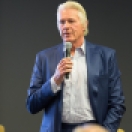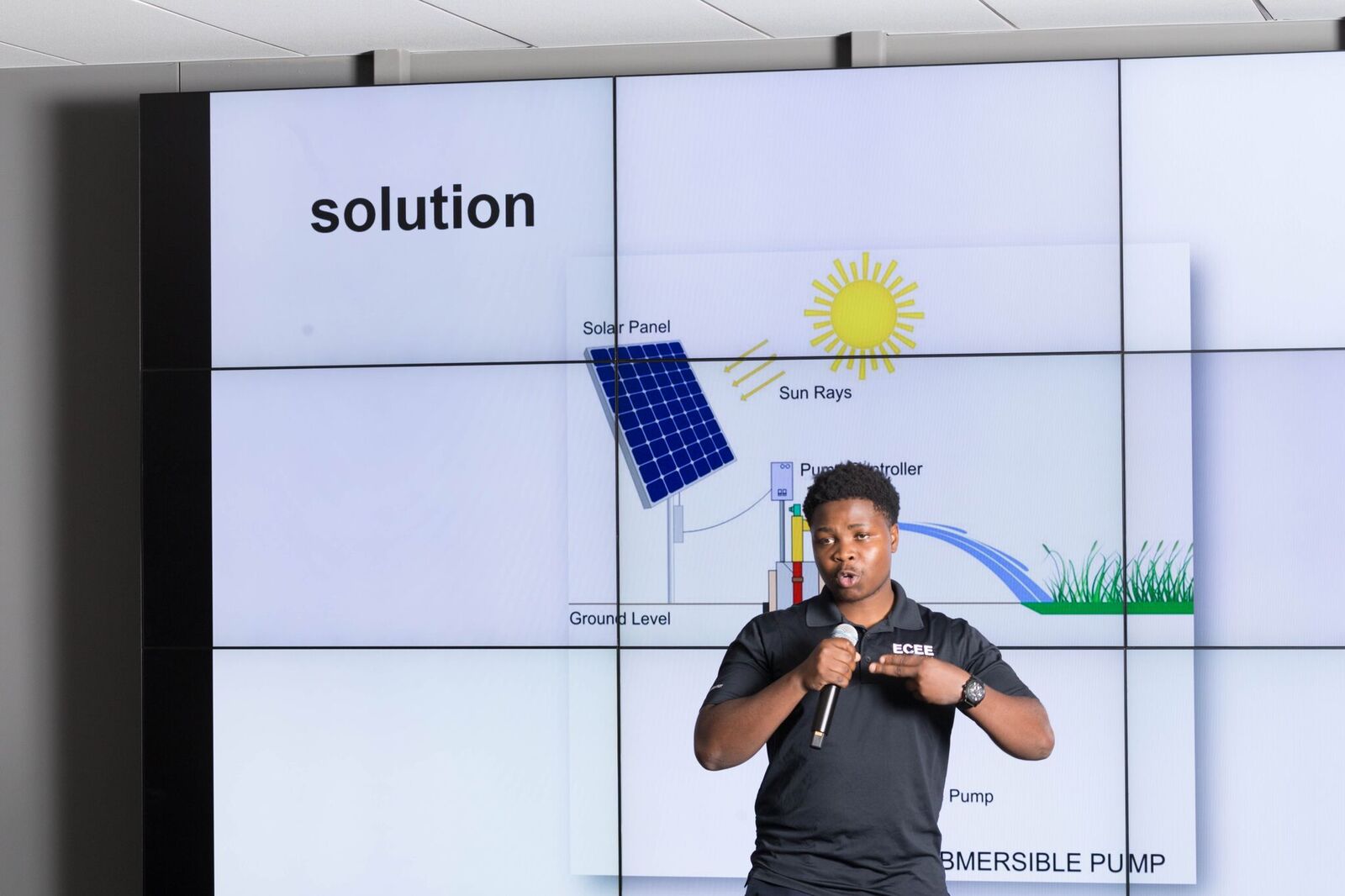No one wants to live in a world overflowing with garbage, but how does a regular person tackle such a complicated problem?
Three Arizona State University sustainability students have come up with a way to guide small organizations painlessly toward zero waste.
And they’ll make money doing it.
Their consulting firm, Circle Blue, will partner with schools, nonprofits and small businesses to find and eliminate waste, saving money and reducing the amount of garbage that goes to the landfills.
“Part of being sustainable is being happy, and in order to be happy we have to make money,” said Eric Johnson (pictured above), one of the Circle Blue team members.
“But that doesn’t mean we do it at the expense of society and the environment. We’re trying to create a new transformative business model to show that you can make money and be sustainable at the same time.”
The Circle Blue team won a $20,000 grant last week from the Pakis Social Entrepreneurship Challenge, defeating two other teams in the pitch competition. The event, sponsored by the Center for Entrepreneurship in the W. P. Carey School of Business at ASU, sought the team with the strongest potential to solve a social challenge.
Success in social entrepreneurship requires a firm grasp of complex problems and the ability to make enough money to be viable.
“Who wants to live in this world?” asked Johnson, showing a photo of overflowing garbage during the pitch event. “In the city of Tempe annually, we sent 1 million tons of waste to the landfill.
“That’s enough to fill Chase Field 14 times from bottom to top.”
Johnson said the firm is harnessing peoples’ desire to do the right thing and empowering them to find a way to do it.
“It’s not easy, but we provide them with the support they need to achieve zero waste,” he said.
The other two finalists were PCs for Refugees, which refurbishes donated computers and gives them to refugee families, and Solar Water Solutions, which retrofits water pumps in rural communities in Zimbabwe with solar-powered technology.
Fred Pakis Fred Pakis is managing director of Clarendon Capital Management and chairman of the Pakis Family Foundation. The Pakis Center for Business Philanthropy is part of the Arizona Community Foundation. Photo by Jordan Johnson/W. P. Carey School of Business, benefactor of the Pakis Center for Business Philanthropy, which funds the competition, said all three teams were strong.
Fred Pakis is managing director of Clarendon Capital Management and chairman of the Pakis Family Foundation. The Pakis Center for Business Philanthropy is part of the Arizona Community Foundation. Photo by Jordan Johnson/W. P. Carey School of Business, benefactor of the Pakis Center for Business Philanthropy, which funds the competition, said all three teams were strong.
“You’re all doing wonderful things for the world, which is the reason we put this contest together.”
Each team was awarded places in the “boot camp” run by Seed Spot, a Phoenix-based entrepreneurship incubator.
This is the second year of the Pakis Challenge. Last year’s winner was All Walks, a nonprofit group that created a program to teach life skills to survivors of sex trafficking. One of the last year’s finalist teams, 33 Buckets, is a nonprofit group that installs water-filtration devices in developing countries, and was featured in an ASU commercial during the Super Bowl.
Here’s more on this year’s teams, which each earned $7,500 for being named finalists:
Circle Blue
The team: Eric Johnson, Sean Murray and Daniel Velez are all master’s students in the School of Sustainability. The venture had its beginnings as Johnson’s thesis project when he was an undergraduate in Barrett, the Honors College.
The mission: Circle Blue is a consulting firm that partners with small to mid-size organizations to divert as much waste from landfills as possible. The company already has worked with Native American Connections on its multifamily housing units, saving it $13,000 on trash fees, and with two schools in the Tempe Elementary School District as pilot projects. Tempe Academy achieved 88 percent waste diversion after working with Circle Blue.
The model: A for-profit consulting firm, the company charges a fee for its services, which begins with a waste audit to see how much is being produced.
“From the outside it looks like we’re dumpster diving, but the reality is that we’re collecting a lot of valuable data,” said Velez.
The team then meets with the people in an organization to see what the obstacles are and to get everyone engaged before adapting new behaviors. At Tempe Academy, that meant a pep rally to fire up the students.
“First we focus on reducing. Are there ways we can minimize the amount of consumption to minimize trash?” Johnson said. “Second we focus on reusing materials. At Tempe Academy, we’ve been able to donate at least 50 pounds of food a day to the homeless. Previously it was going to a landfill.”
At some organizations, especially schools, up to 75 percent of waste is food, so composting is an important element.
“If you’re able to take that and create compost, that compost gets repurposed to grow new food,” Johnson said.
Why they do it: The team has done a lot of research on attitudes about sustainability and realized that while most people embrace it as a concept, they don’t know how to do it.
“We want to help people find the solutions they need. There’s a big disconnect between belief and action, and we’re trying to fill that gap,” Murray said.
What’s next: Circle Blue will use the $20,000 to expand its services to all schools in the Tempe district and to ramp up the business.
Riad Sbai, co-founder of PCs for Refugees, sets up a computer for a Syrian family. The organization takes donated laptops and personal computers, refurbishes them and gives them to refugees.
PCs for Refugees
The team: Riad Sbai, who has a master’s degree in health care delivery from ASU and now works as a web developer for a health care company; Louis Ship, a computer systems engineering major; Abdul Bayazid, a health sciences major; and Sudip Thomas, an employee at Intel. Sbai and Bayazid are Syrian Americans, and Sbai has lost family members to the war in Syria.
“The most difficult part of it all was the feeling of helplessness,” Sbai said. “The refugee community is a vulnerable population, and it’s more important than ever to show we do support them and want them to succeed.”
About 10 months ago, he and Bayazid began visiting newly arrived refugees and noticed that none of them had computers.
The mission: PCs for Refugees collects donated personal computers and laptops, refurbishes them and distributes them to Syrian refugee families who have settled in metro Phoenix. Then they work with Cox Communications, which has a program that provides internet service to low-income families with kids for $9.95 a month with no installation, modem or cancellation fees. The team members also provide computer training for each family. So far the team has donated to 97 families, with six refugees acquiring jobs because they had access to a computer.
The model: The team recently made PCs for Refugees a 501c3 nonprofit organization, so donations are tax-deductible.
Why they do it: “Lack of a computer is a big limitation. Everyone relies on a computer for doing homework, job searches, applications for scholarships and accessing resources,” Sbai said.
The biggest challenge for the families is learning English, and the PCs come with English-tutoring software, as well as educational and professional programs.
The first family that received a computer included a daughter who is disabled.
“This computer was really her lifeline to the world,” Sbai said.
The $7,500 finalist grant was a big help, because it costs $15 to $18 to refurbish each computer, usually for batteries, adapters, speakers, mice, monitors and other peripherals. Thomas took on the job of driving all over the Valley to pick up donations and deliver them to Sbai.
What’s next: The team hopes to expand to refugees from other countries besides Syria and to offer other computer skills, and will start a PCs for Refugees Club at ASU.
Ngoni Mugwisi, co-founder of Solar Water Solutions, describes the project during the Pakis Social Entrepreneurship Challenge. Photo by Jordan Johnson/W. P. Carey School of Business
Solar Water Solutions
The team: Ngoni Mugwisi and Mohammed Munir, both electrical engineering majors; Allistar Machacek, a construction management major.
The project began in EPICS, the Engineering Projects in Community Service course in which teams design, build and deploy systems to solve engineering-based problems for charities, schools and other not-for-profit organizations.
“It started as a sustainable gardens project, but the biggest way to improve is to learn from your mistakes and we learned that the project didn’t work quite as well as we thought it would,” Munir said. “So we shifted to water.”
The mission: Solar Water Solutions will retrofit existing water pumps with solar-powered submersible pumps in rural communities in sub-Saharan Africa. The team installed one pump in 2015 that supplies 48 households.
“They were really happy about the outcome, and it improved their lives on many different levels. They started a little garden next to the pump,” Mugwisi said.
The model: Solar Water Solutions is a hybrid nonprofit and for-profit model that works this way: A rural community will receive a free pump and, with more water, can increase its harvest profits, which will allow it to invest in the next pump in another community. The venture also will sell pump kits that have added functionality for solar-powered lights and Wi-Fi to boarding schools in Zimbabwe. The sale of five kits will fund one nonprofit pump. Operation of the pumps will be supervised by a local committee in the communities, which handles maintenance and security.
Why they do it: Most rural communities use hand-powered pumps, which are labor-intensive and take a long time.
“We realized we could go to existing pumps and retrofit them with solar panels, so now it’s not only pumping water but storing it, so anyone can turn on the faucet and have water,” Munir said.
What’s next: Solar Water Solutions is planning to install seven pumps in Zimbabwe this summer and eventually hire a director to supervise operations there. Next fall, Mugwisi will be working on his PhD at Oxford University as a Rhodes Scholar.
Top photo: Eric Johnson is one of the members of Circle Blue, which will partner with schools, nonprofits and small businesses to find and eliminate waste, saving money and reducing the amount of garbage that goes to the landfills. Photo by Jordan Johnson/W. P. Carey School of Business
More Environment and sustainability

Rethinking Water West conference explores sustainable solutions
How do you secure a future with clean, affordable water for fast-growing populations in places that are contending with unending drought, rising heat and a lot of outdated water supply infrastructure…
Meet the young students who designed an ocean-cleaning robot
A classroom in the middle of the Sonoran Desert might be the last place you’d expect to find ocean research — but that’s exactly what’s happening at Harvest Preparatory Academy in Yuma, Arizona.…

From ASU to the Amazon: Student bridges communities with solar canoe project
While Elizabeth Swanson Andi’s peers were lining up to collect their diplomas at the fall 2018 graduation ceremony at Arizona State University, she was on a plane headed to the Amazon rainforest in…




